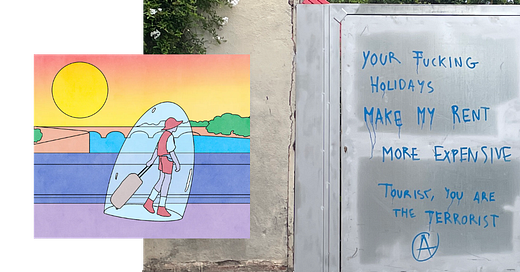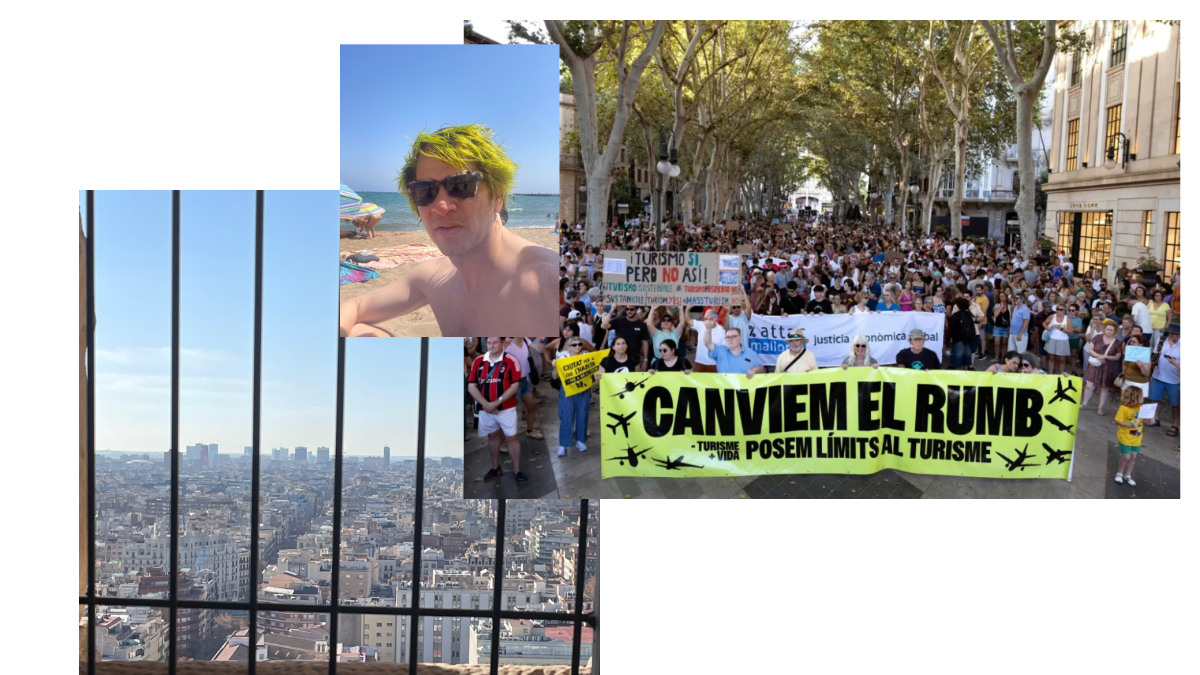why people in europe DO NOT want you to visit 😤🪧🚷
On moving abroad, tourism protests, and how vacations fuel xenophobia.
“How long are you there for?” the financial person said. “We can meet when you’re back in Los Angeles.”
“That sounds good,” I said. “But we live in Barcelona.”
“When are you coming back?”
“We won’t be back until March, at the earliest, unless something happens.”
“Oh. We can wait until then, I guess.”
We chatted about a few other things — savings goals, 401Ks, life insurance — before saying our goodbyes.
“And you,” the financial person said. “You keep enjoying your vacation. I’m so jealous!”
“Well,” I said. “That’s not it but okay.”
We hung up and I thought about how I’ve had that conversation on more times than I can count on my fingers and toes, perhaps even Bobby and the dogs’ fingers and toes too. I join a call for work, at a desk and at my computer, pen in hand, paper next to me, working as we all do. “Where are you, Kyle?” someone asks. “I’m on east coast hours,” I say, stretching truth, trying to move on. “But where on the east coast?” they ask. “I’m actually in Barcelona, Spain.” Eyes go wide, people lean in. “I want to go there,” someone says. “I’ve been dying to go on vacation.”
I nod and I give my usual speech, which I’ve reduced to a beat-by-beat breakdown: I live here and I work here. This city, like all cities, is another place where people live and work and try to live and work just like you live and work. I am not on vacation, nor are other people who live here on vacation. This usually gets some nods and then more questions. Are you going to Ibiza? Where can I find good paella? My sister went to Barcelona two months ago: did you see her? Can I come stay with you? Isn’t it the best place in the world? Aren’t you just the happiest?
Each vicarious question is like a very small dart, which leaves small nicks on the metaphysical body. A year ago, they would have ruined my day, they would have eaten up my psyche. Bobby and I moved to Europe two years ago because, in 2017, after a few very meaningful trips to Paris, we felt that the city had many of the qualities that we wanted in a city and a life — and we made a plan to move. That required a lot of saving, a lot of long-term and short-term planning, to be able to make it to Europe by 2022, before Bobby turned 40. We hit the goal (Yay!) but it wasn’t without difficulties and sacrifices, of having to leave so much behind that you don’t think about until you’re days and weeks and months within the dream you worked so hard to get to. Then comes the depression and the loneliness and you wonder what you did.
Moving isn’t new to me, nor is it a “challenge”: it’s muscle memory, as my father was in the military and we lived in seven states and two countries. I attended 12 schools, from the first day of kindergarten through college graduation: transition, change, packing up and moving on (And the loneliness that comes with it.) is part of my operating system. The challenge is that, the older you get, the more history you have, the more immovable you become: leaving the United States is easy until you find that your homeland is like the boyfriend who you had to break up with out of inconvenience, not because of love lost, not because it was bad for you. It just wasn’t working, too many small problems to fix, despite all the really great qualities he has. Unfortunately, this now ex-boyfriend happens to also be a celebrity and everyone wants to talk about him and his work and what he is doing and how they can help them. Especially his work in Los Angeles! “Why are you here?” Europeans ask. “I want to move to Los Angeles. Dreams come true there.” You laugh and say it’s complicated. People walk by with t-shirts from UCLA, sweatshirts that say WISCONSIN. “It’s just always been on my bucket list, to visit Wisconsin,” a young woman in Ireland tells Conan O’Brien. That boyfriend, you realize, has done the best job at making everyone love him, of making their fantasies — past, present, and future — come true. After all: that’s why you love him too.
But your new boyfriend: he has the same effect on people back home. Being in this place, I’ve discovered a phenomenon of inebriation that I think most people are shielded from or, in ways, they don’t realize it exists until they are deep in it, which they have no way of seeing without a great degree of self-awareness: Vacation Brain™. So many people — family, old friends, new friends, people I’m meeting for the first time because I promised a mutual to meet up — I encounter while visiting Europe have Vacation Brain™. “I could live in this part of town,” someone says, about a part of the city you avoid because it stinks of pee. “Have you eaten this? It’s the best thing I’ve ever had,” someone says, of food that is notedly mid. “You have to visit,” someone recommends, which is a museum we avoid for being a tourist trap.
Vacation Brain™ is a sort of high where everything is the best thing ever: the food, the people, the place, the weather — everything is perfect, because you are on vacation. Inconveniences can and do happen, sure, but you are having the time of your life and everyone and everything around you is in service of your vacation, of the thing that you earned and feel so deserving of. A variety of Main Character Syndrome, it’s a strain of myopia where it’s you then the world, where you are in an alternate universe outside of “real life” where every glass of wine, every bank account, every belly is full and you are feeling great, no matter who you have to step on en route to this pleasure zone. You see this person everywhere, popping up on your feeds: the friend you knew is gone, in their place is a glowing, mentally warped doppelgänger who you unwittingly cheer as they entertain adventures, feeding their high with your own recommendations. And why wouldn’t you do that? You too long to do what they’re doing. Like any drug, you want to take a hit and be high on Vacation Brain™ too.
This behavior isn’t cool but you won’t ever notice this behavior in yourself until you see it in others, that you are looking at the world as a feast to eat instead of being one of many who are also trying to live life. This could be what explains the recent rash of anti-vacation sentiment, of stories that have emerged between last summer and this summer: vacation as destination, as mind-altering substance, is a form of privilege, of neo-colonialism, that seems to reveal a deeply consumptive mindset. “Vacation and leisure is fairly new in human history,” art historian Seema Rao explains. “You can go to a luxury space no matter what class you are, but often it’s hard to fit into the norms.”
You may have heard — You may have even asked me about this! — but there have been protests in cities like Barcelona that are against tourists. “TOURISTS GO HOME” they shout, spraying squirt guns, blocking hotel guests from exiting their lodging, as Airbnb is barred and slogans to visit are retracted. Yes, this all has happened (now famously) in Barcelona but it also has happened in Lake Como, Sintra, Mallorca, the Canary Islands, Venice, Ibiza, Santorini, Athens: the list goes on and on.
“But does that mean I can’t visit?” someone asks which, unfortunately, misses the point. The Vacation Brain™ has taken hold and they’re unable to see or hear the real people behind the asks to not visit.
Keep reading with a 7-day free trial
Subscribe to The Trend Report™ to keep reading this post and get 7 days of free access to the full post archives.







